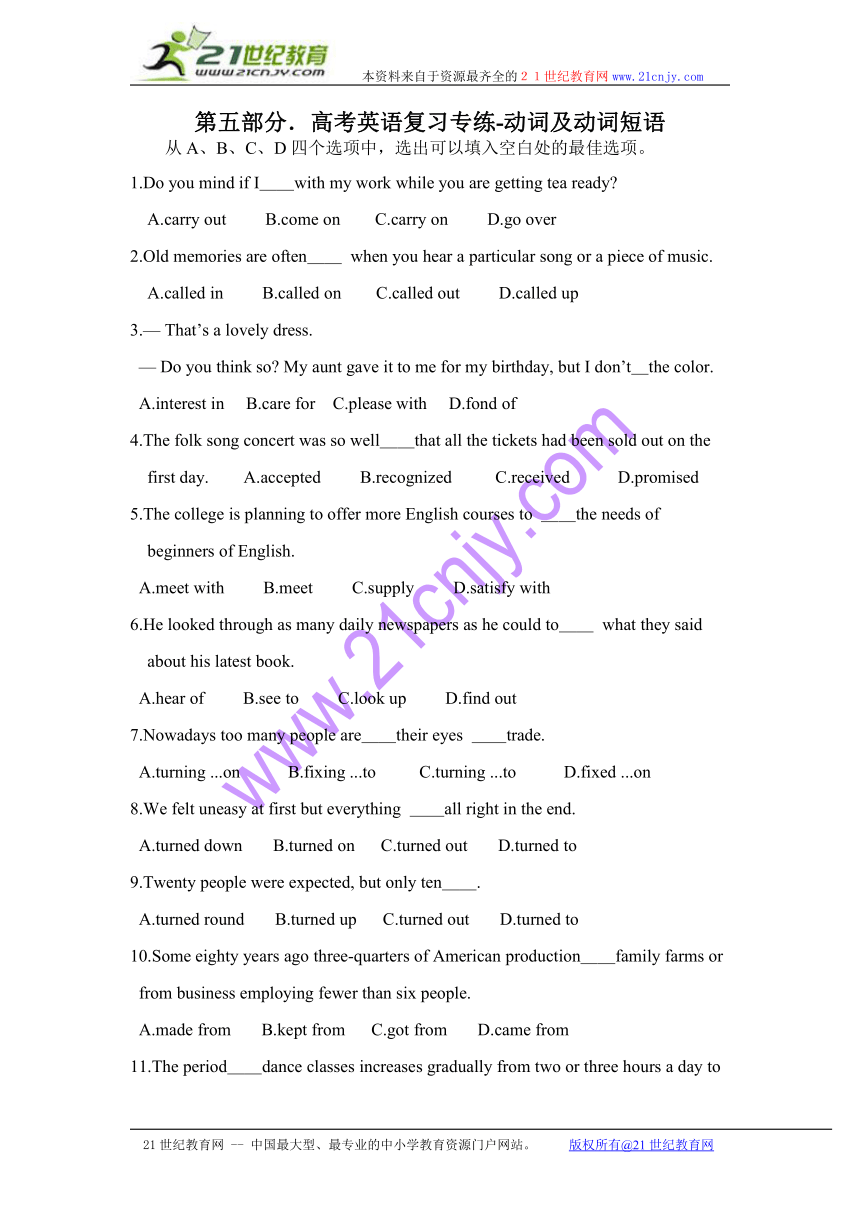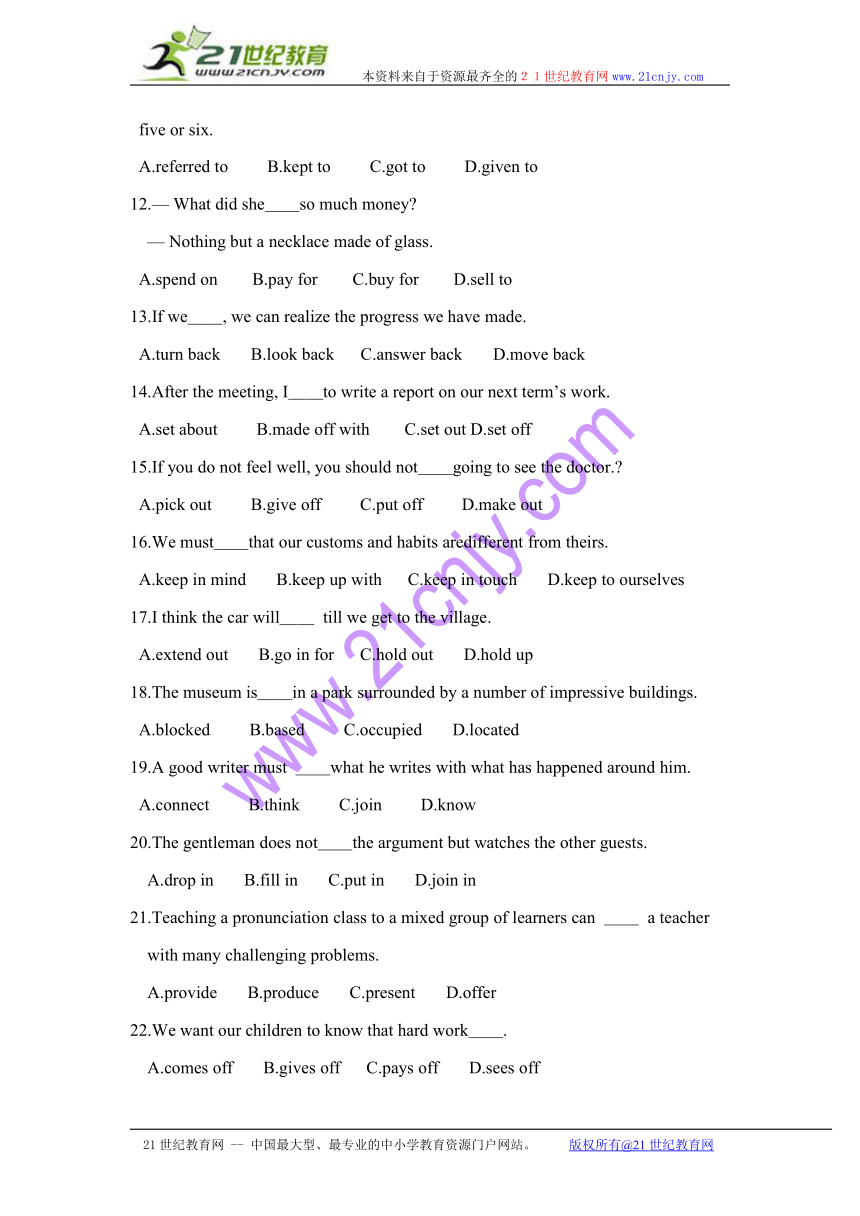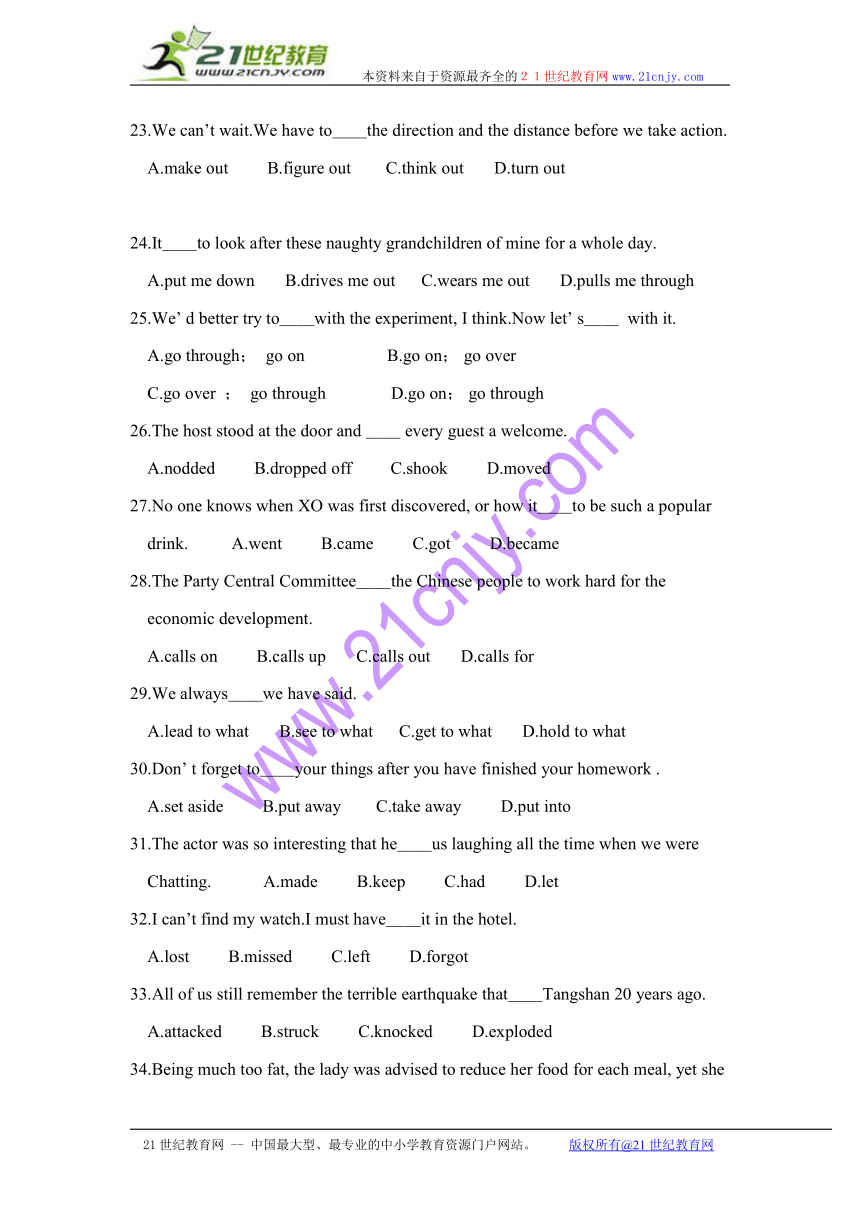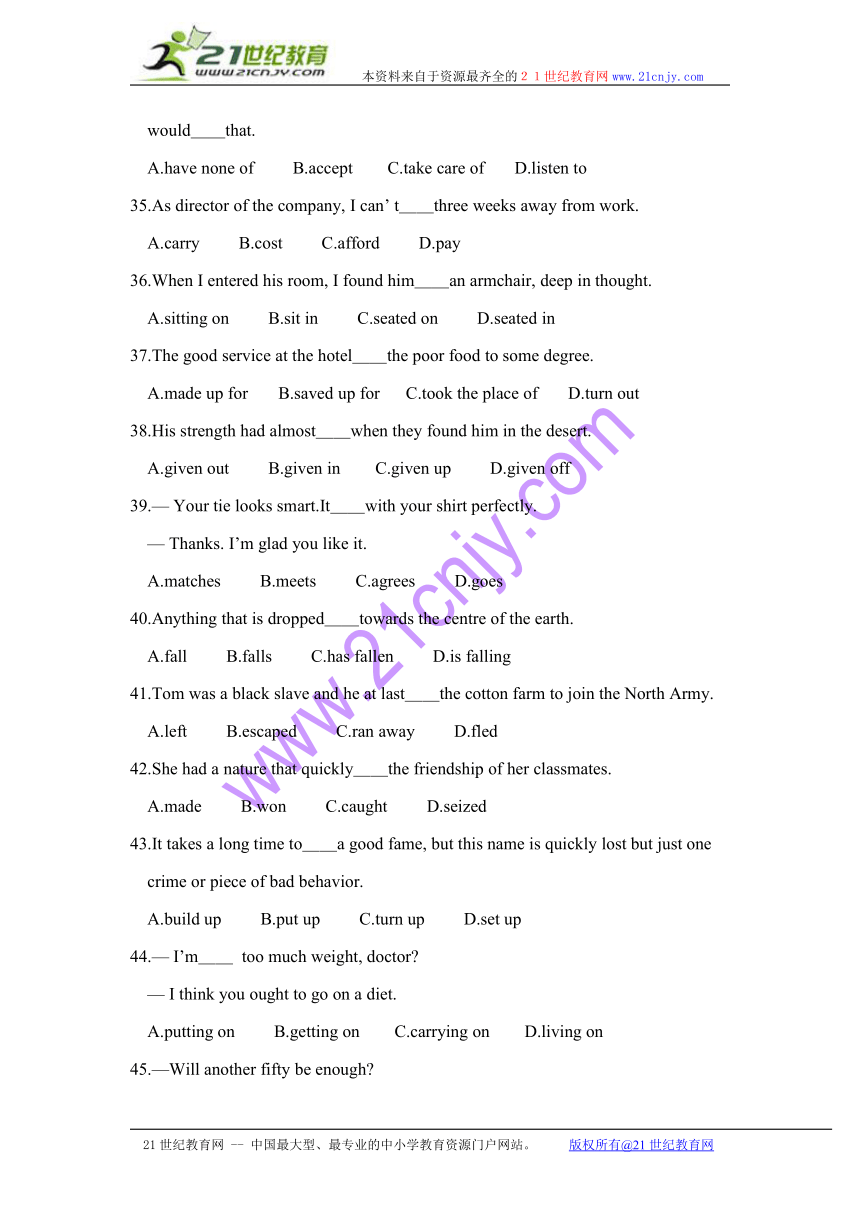高考英语2011专项复习精编(5.动词及动词短语)
文档属性
| 名称 | 高考英语2011专项复习精编(5.动词及动词短语) |  | |
| 格式 | rar | ||
| 文件大小 | 17.8KB | ||
| 资源类型 | 教案 | ||
| 版本资源 | 通用版 | ||
| 科目 | 英语 | ||
| 更新时间 | 2011-03-07 12:08:00 | ||
图片预览




文档简介
第五部分.高考英语复习专练-动词及动词短语
从A、B、C、D四个选项中,选出可以填入空白处的最佳选项。
1.Do you mind if I__with my work while you are getting tea ready?
A.carry out? B.come on C.carry on? D.go over
2.Old memories are often__ when you hear a particular song or a piece of music.
A.called in ?B.called on C.called out? D.called up
3.— That’s a lovely dress.
— Do you think so? My aunt gave it to me for my birthday, but I don’t_the color.
A.interest in? B.care for C.please with? D.fond of
4.The folk song concert was so well__that all the tickets had been sold out on the
first day. A.accepted? B.recognized C.received? D.promised
5.The college is planning to offer more English courses to __the needs of
beginners of English.
A.meet with? B.meet? C.supply? D.satisfy with
6.He looked through as many daily newspapers as he could to__ what they said
about his latest book.
A.hear of? B.see to? C.look up? D.find out
7.Nowadays too many people are__their eyes __trade.
A.turning ...on? B.fixing ...to C.turning ...to? D.fixed ...on
8.We felt uneasy at first but everything __all right in the end.
A.turned down? B.turned on C.turned out? D.turned to
9.Twenty people were expected, but only ten__.
A.turned round? B.turned up C.turned out? D.turned to
10.Some eighty years ago three-quarters of American production__family farms or
from business employing fewer than six people.
A.made from? B.kept from C.got from? D.came from
11.The period__dance classes increases gradually from two or three hours a day to
five or six.
A.referred to? B.kept to? C.got to? D.given to
12.— What did she__so much money?
— Nothing but a necklace made of glass.
A.spend on B.pay for C.buy for D.sell to
13.If we__, we can realize the progress we have made.
A.turn back? B.look back C.answer back? D.move back
14.After the meeting, I__to write a report on our next term’s work.
A.set about? B.made off?with C.set out?D.set off
15.If you do not feel well, you should not__going to see the doctor.?
A.pick out? B.give off? C.put off? D.make out
16.We must__that our customs and habits aredifferent from theirs.
A.keep in mind? B.keep up with C.keep in touch? D.keep to ourselves
17.I think the car will__ till we get to the village.
A.extend out? B.go in for C.hold out? D.hold up
18.The museum is__in a park surrounded by a number of impressive buildings.
A.blocked? B.based? C.occupied? D.located
19.A good writer must __what he writes with what has happened around him.
A.connect? B.think ?C.join? D.know
20.The gentleman does not__the argument but watches the other guests.
A.drop in? B.fill in? C.put in? D.join in
21.Teaching a pronunciation class to a mixed group of learners can __ a teacher
with many challenging problems.
A.provide? B.produce? C.present? D.offer
22.We want our children to know that hard work__.
A.comes off? B.gives off C.pays off? D.sees off
23.We can’t wait.We have to__the direction and the distance before we take action.
A.make out? B.figure out C.think out? D.turn out
24.It__to look after these naughty grandchildren of mine for a whole day.
A.put me down? B.drives me out C.wears me out? D.pulls me through
25.We’ d better try to__with the experiment, I think.Now let’ s__ with it.
A.go through; go on? B.go on;?go over
C.go over ; go through ?D.go on;?go through
26.The host stood at the door and?__?every guest a welcome.
A.nodded? B.dropped off? C.shook ?D.moved
27.No one knows when XO was first discovered, or how it__to be such a popular
drink. A.went? B.came? C.got? D.became
28.The Party Central Committee__the Chinese people to work hard for the
economic development.
A.calls on? B.calls up? C.calls out? D.calls for
29.We always__we have said.
A.lead to what? B.see to what C.get to what? D.hold to what
30.Don’ t forget to__your things after you have finished your homework .
A.set aside? B.put away C.take away? D.put into
31.The actor was so interesting that he__us laughing all the time when we were
Chatting. A.made? B.keep? C.had? D.let
32.I can’t find my watch.I must have__it in the hotel.
A.lost? B.missed? C.left? D.forgot
33.All of us still remember the terrible earthquake that__Tangshan 20 years ago.
A.attacked? B.struck? C.knocked ?D.exploded
34.Being much too fat, the lady was advised to reduce her food for each meal, yet she
would__that.
A.have none of ?B.accept C.take care of? D.listen to
35.As director of the company, I can’ t__three weeks away from work.
A.carry? B.cost? C.afford ?D.pay
36.When I entered his room, I found him__an armchair, deep in thought.
A.sitting on? B.sit in? C.seated on? D.seated in
37.The good service at the hotel__the poor food to some degree.
A.made up for ? B.saved up for C.took the place of ?D.turn out
38.His strength had almost__when they found him in the desert.
A.given out? B.given in C.given up? D.given off
39.— Your tie looks smart.It__with your shirt perfectly.
— Thanks. I’m glad you like it.
A.matches? B.meets ?C.agrees ?D.goes
40.Anything that is dropped__towards the centre of the earth.
A.fall ?B.falls ?C.has fallen? D.is falling
41.Tom was a black slave and he at last__the cotton farm to join the North Army.
A.left? B.escaped ?C.ran away? D.fled
42.She had a nature that quickly__the friendship of her classmates.
A.made ?B.won? C.caught ?D.seized
43.It takes a long time to__a good fame, but this name is quickly lost but just one
crime or piece of bad behavior.
A.build up? B.put up? C.turn up? D.set up
44.— I’m__ too much weight, doctor?
— I think you ought to go on a diet.
A.putting on? B.getting on C.carrying on D.living on
45.—Will another fifty be enough?
—Just twenty will__.
A.work? B.do? C.suit? D.fit
46.His pale face__a reluctant smile when he heard the news.
A.came on? B.was taken on C.took on? D.turned into
47.Although the working mother is very busy, she still__a lot of time to children. A.devotes? B.spends ?C.offers? D.provides
48.The thing that__is not whether you fail or not, but whether you try it or not.
A.matters? B.cares? C.considers? D.minds
49.Your football team__ours on Sunday, but we__the game yesterday afternoon.
A.beat; beat? B.beat; won C.won; won? D.won; beat
50.—Can I help you?
—I’d like a room with a bath.How much do you?
A.offer ?B.afford? C.charge? D.spare
参考答案
1.C。carry on with sth.意为“继续做某事”;carry out意为“实行,执行”。
2.D。call up意为“使人想起;打电话”;call on 意思是“号召”;call in 有“收回,请来”等意;call out 有“出动,唤起,引起,大声叫出来“等意。
3.B。care for 在这里是“喜欢”的意思。
4.C。be well received意为“很受欢迎”。
5.B。meet 在这里是“满足,符合”的意思。
6.D。find out意思是“查清,弄明白”;see to 意思是“处理,负责”;look up意思是“查找(单词等)”。
7.C。turn...to...在这里意思是“把……转向……”。D有一定干扰性,可以说 fix one’s eyes on (upon) sth.,但语态不正确。
8.C。turn out 在这里意思是“证明是,结果是”,为连系动词;turn on 意思是“打开”;turn to 意思是“参考,转向,求助于”。
9.B。turn up 在这里是“出现,露面”的意思;turn round 意为“转身,转变”;turn in 意为“上交”。
10.D。come from表示“来自于”。
11.D。given to dance classes为过去分词短语作定语,相当于that was given to dance classes,意思是“分给舞蹈课的时间”。
12.C。表示花费的几个动词的搭配是这样的:sb.spend some money on sth.; sb.pay some money for sth.; sb.buy sth.for some money。
13.B。look back在这里是“回顾”的意思。
14.C。set out to do sth./set about doing sth.意为“着手做某事”。
15.C。put off 在这里是“拖延,延期”的意思。pick out 意思是“挑选出”;give off 意思是“释放,发出;”make out意为“制定出,理解,辨认出”,因此其它答案不符合题意。16.A。keep in mind意为“记住”,空后的that 从句为keep的宾语。
17.C。hold out 在这里是“支持,维持”的意思。如:How long will the enemy’s food supplies hold out? hold up 意思是“举起,支撑,阻挡”。
18.D。be located in,意思是“位于”。
19.A。本句话的意思是“一个好的作家必须把他所写的与周围发生的事联系起来。”join与to搭配,表示“连接”。
20.D。join in有“加入(到某项活动中去)”的意思; drop in意思是“拜访”;fill in意思是“填补”。
21.C。provide,present,offer 都有“提供”的意思。provide 意思是“装备,供给(某物)”如:The villagers provided the guerrillas (游击队) with food; present 则表示“呈献给某人(某种状况)”;offer构成offer sb.sth.或offer sth.to sb.的搭配。
22.C。pay off 在这里意为“回报”;see off 意思是“给……送行”。
23.B。figure out 在这里有“计算出”的意思;think out意思是“想出”。
24.C。wear sb.out“使人筋疲力尽”。
25.A。go through with sth.意思是“做完,完成”;go on with 意思是“继续”。
26.A。nod sb.a welcome意思是“向某人点头表示欢迎”。
27.B。come to 在这里有“开始”之意。
28.A。call on sb.to do sth.意思是“号召某人做某事”。
29.D。hold to 意为“坚持(观点,理论等)”。本句话意思是“我们一直坚持我们所说的。"
30.B。put away意为“收起来”。
31.C。have/keep sb./sth.doing sth.意为“使某人(物)一直做某事”。B项时态错误。32.C。表示“忘带,遗留”,英语中要用leave,不可用forget.
33.B。表示自然灾害“侵害”了某地,可以用hit 或strike。attack表示“进攻,袭击”,多表示用武力进攻;knock是“敲打”的意思。
34.A。have none of sth.意思是“不理睬;不接受”。
35.C。afford意思是“负担得起(时间或金钱)”。
36.D。seat为及物动词,作宾补用seated(相当于sitting);(坐)在有扶手的椅子上,用介词in。
37.A。make up for 意思是“弥补”。本句的意思是“宾馆优质的服务在一定程度上弥补了不好的饭菜。”
38.A。give out在这里为不及物动词,意思是“用完,耗尽”;give in 意思是“屈服,投降”;give up意思是“放弃”; give off 意思是“释放,发出”。
39.D。go with在这里是“与……相配”的意思;match 也有此意,但match 为及物动词;agree with 有“与……相适应“的意思,因此不合题意。
40.B。描述客观事实,用一般现在时。
41.D。escape,run away 都有“逃脱”的意思,后需加from。
42.B。win在这里是“赢得,获得”的意思。
43.A。build up 有“树立,逐步建立”的意思,其宾语可以是表示荣誉、名望等的名词。put up 意思是“(具体的)建造”,其宾语为房屋、桥梁、道路等;set up多指组织、单位、机构的建设。
44.A。put on weight 意思是“发胖,增加重量”。
45.B。do 在这里的意思是“行,可以,起作用”。又如:“What do you want for your birthday?” “Anything will do.”
46.C。take on 在这里是“呈现”的意思。
47.A。C项有较大干扰性。offer sth.to sb.意思是“提供某物给某人”;devote one’s time to sb./ sth./doing sth.意思是“把时间用在某人(某事或做某事上)”。
48.A。matter在这里的意思是“有关系,要紧”。D项有一定干扰性。mind的意思是“在意,在乎”,其主语是人。
49.B。win和beat分别是“赢”,“击败”的意思,但 win 的宾语是比赛,而不可以 是对手;beat 的宾语是对手。
50.C。charge 在这里是“收费”的意思。offer提供;afford支付得起;spare空出(时间,金钱),因此其它答案不合题意。
从A、B、C、D四个选项中,选出可以填入空白处的最佳选项。
1.Do you mind if I__with my work while you are getting tea ready?
A.carry out? B.come on C.carry on? D.go over
2.Old memories are often__ when you hear a particular song or a piece of music.
A.called in ?B.called on C.called out? D.called up
3.— That’s a lovely dress.
— Do you think so? My aunt gave it to me for my birthday, but I don’t_the color.
A.interest in? B.care for C.please with? D.fond of
4.The folk song concert was so well__that all the tickets had been sold out on the
first day. A.accepted? B.recognized C.received? D.promised
5.The college is planning to offer more English courses to __the needs of
beginners of English.
A.meet with? B.meet? C.supply? D.satisfy with
6.He looked through as many daily newspapers as he could to__ what they said
about his latest book.
A.hear of? B.see to? C.look up? D.find out
7.Nowadays too many people are__their eyes __trade.
A.turning ...on? B.fixing ...to C.turning ...to? D.fixed ...on
8.We felt uneasy at first but everything __all right in the end.
A.turned down? B.turned on C.turned out? D.turned to
9.Twenty people were expected, but only ten__.
A.turned round? B.turned up C.turned out? D.turned to
10.Some eighty years ago three-quarters of American production__family farms or
from business employing fewer than six people.
A.made from? B.kept from C.got from? D.came from
11.The period__dance classes increases gradually from two or three hours a day to
five or six.
A.referred to? B.kept to? C.got to? D.given to
12.— What did she__so much money?
— Nothing but a necklace made of glass.
A.spend on B.pay for C.buy for D.sell to
13.If we__, we can realize the progress we have made.
A.turn back? B.look back C.answer back? D.move back
14.After the meeting, I__to write a report on our next term’s work.
A.set about? B.made off?with C.set out?D.set off
15.If you do not feel well, you should not__going to see the doctor.?
A.pick out? B.give off? C.put off? D.make out
16.We must__that our customs and habits aredifferent from theirs.
A.keep in mind? B.keep up with C.keep in touch? D.keep to ourselves
17.I think the car will__ till we get to the village.
A.extend out? B.go in for C.hold out? D.hold up
18.The museum is__in a park surrounded by a number of impressive buildings.
A.blocked? B.based? C.occupied? D.located
19.A good writer must __what he writes with what has happened around him.
A.connect? B.think ?C.join? D.know
20.The gentleman does not__the argument but watches the other guests.
A.drop in? B.fill in? C.put in? D.join in
21.Teaching a pronunciation class to a mixed group of learners can __ a teacher
with many challenging problems.
A.provide? B.produce? C.present? D.offer
22.We want our children to know that hard work__.
A.comes off? B.gives off C.pays off? D.sees off
23.We can’t wait.We have to__the direction and the distance before we take action.
A.make out? B.figure out C.think out? D.turn out
24.It__to look after these naughty grandchildren of mine for a whole day.
A.put me down? B.drives me out C.wears me out? D.pulls me through
25.We’ d better try to__with the experiment, I think.Now let’ s__ with it.
A.go through; go on? B.go on;?go over
C.go over ; go through ?D.go on;?go through
26.The host stood at the door and?__?every guest a welcome.
A.nodded? B.dropped off? C.shook ?D.moved
27.No one knows when XO was first discovered, or how it__to be such a popular
drink. A.went? B.came? C.got? D.became
28.The Party Central Committee__the Chinese people to work hard for the
economic development.
A.calls on? B.calls up? C.calls out? D.calls for
29.We always__we have said.
A.lead to what? B.see to what C.get to what? D.hold to what
30.Don’ t forget to__your things after you have finished your homework .
A.set aside? B.put away C.take away? D.put into
31.The actor was so interesting that he__us laughing all the time when we were
Chatting. A.made? B.keep? C.had? D.let
32.I can’t find my watch.I must have__it in the hotel.
A.lost? B.missed? C.left? D.forgot
33.All of us still remember the terrible earthquake that__Tangshan 20 years ago.
A.attacked? B.struck? C.knocked ?D.exploded
34.Being much too fat, the lady was advised to reduce her food for each meal, yet she
would__that.
A.have none of ?B.accept C.take care of? D.listen to
35.As director of the company, I can’ t__three weeks away from work.
A.carry? B.cost? C.afford ?D.pay
36.When I entered his room, I found him__an armchair, deep in thought.
A.sitting on? B.sit in? C.seated on? D.seated in
37.The good service at the hotel__the poor food to some degree.
A.made up for ? B.saved up for C.took the place of ?D.turn out
38.His strength had almost__when they found him in the desert.
A.given out? B.given in C.given up? D.given off
39.— Your tie looks smart.It__with your shirt perfectly.
— Thanks. I’m glad you like it.
A.matches? B.meets ?C.agrees ?D.goes
40.Anything that is dropped__towards the centre of the earth.
A.fall ?B.falls ?C.has fallen? D.is falling
41.Tom was a black slave and he at last__the cotton farm to join the North Army.
A.left? B.escaped ?C.ran away? D.fled
42.She had a nature that quickly__the friendship of her classmates.
A.made ?B.won? C.caught ?D.seized
43.It takes a long time to__a good fame, but this name is quickly lost but just one
crime or piece of bad behavior.
A.build up? B.put up? C.turn up? D.set up
44.— I’m__ too much weight, doctor?
— I think you ought to go on a diet.
A.putting on? B.getting on C.carrying on D.living on
45.—Will another fifty be enough?
—Just twenty will__.
A.work? B.do? C.suit? D.fit
46.His pale face__a reluctant smile when he heard the news.
A.came on? B.was taken on C.took on? D.turned into
47.Although the working mother is very busy, she still__a lot of time to children. A.devotes? B.spends ?C.offers? D.provides
48.The thing that__is not whether you fail or not, but whether you try it or not.
A.matters? B.cares? C.considers? D.minds
49.Your football team__ours on Sunday, but we__the game yesterday afternoon.
A.beat; beat? B.beat; won C.won; won? D.won; beat
50.—Can I help you?
—I’d like a room with a bath.How much do you?
A.offer ?B.afford? C.charge? D.spare
参考答案
1.C。carry on with sth.意为“继续做某事”;carry out意为“实行,执行”。
2.D。call up意为“使人想起;打电话”;call on 意思是“号召”;call in 有“收回,请来”等意;call out 有“出动,唤起,引起,大声叫出来“等意。
3.B。care for 在这里是“喜欢”的意思。
4.C。be well received意为“很受欢迎”。
5.B。meet 在这里是“满足,符合”的意思。
6.D。find out意思是“查清,弄明白”;see to 意思是“处理,负责”;look up意思是“查找(单词等)”。
7.C。turn...to...在这里意思是“把……转向……”。D有一定干扰性,可以说 fix one’s eyes on (upon) sth.,但语态不正确。
8.C。turn out 在这里意思是“证明是,结果是”,为连系动词;turn on 意思是“打开”;turn to 意思是“参考,转向,求助于”。
9.B。turn up 在这里是“出现,露面”的意思;turn round 意为“转身,转变”;turn in 意为“上交”。
10.D。come from表示“来自于”。
11.D。given to dance classes为过去分词短语作定语,相当于that was given to dance classes,意思是“分给舞蹈课的时间”。
12.C。表示花费的几个动词的搭配是这样的:sb.spend some money on sth.; sb.pay some money for sth.; sb.buy sth.for some money。
13.B。look back在这里是“回顾”的意思。
14.C。set out to do sth./set about doing sth.意为“着手做某事”。
15.C。put off 在这里是“拖延,延期”的意思。pick out 意思是“挑选出”;give off 意思是“释放,发出;”make out意为“制定出,理解,辨认出”,因此其它答案不符合题意。16.A。keep in mind意为“记住”,空后的that 从句为keep的宾语。
17.C。hold out 在这里是“支持,维持”的意思。如:How long will the enemy’s food supplies hold out? hold up 意思是“举起,支撑,阻挡”。
18.D。be located in,意思是“位于”。
19.A。本句话的意思是“一个好的作家必须把他所写的与周围发生的事联系起来。”join与to搭配,表示“连接”。
20.D。join in有“加入(到某项活动中去)”的意思; drop in意思是“拜访”;fill in意思是“填补”。
21.C。provide,present,offer 都有“提供”的意思。provide 意思是“装备,供给(某物)”如:The villagers provided the guerrillas (游击队) with food; present 则表示“呈献给某人(某种状况)”;offer构成offer sb.sth.或offer sth.to sb.的搭配。
22.C。pay off 在这里意为“回报”;see off 意思是“给……送行”。
23.B。figure out 在这里有“计算出”的意思;think out意思是“想出”。
24.C。wear sb.out“使人筋疲力尽”。
25.A。go through with sth.意思是“做完,完成”;go on with 意思是“继续”。
26.A。nod sb.a welcome意思是“向某人点头表示欢迎”。
27.B。come to 在这里有“开始”之意。
28.A。call on sb.to do sth.意思是“号召某人做某事”。
29.D。hold to 意为“坚持(观点,理论等)”。本句话意思是“我们一直坚持我们所说的。"
30.B。put away意为“收起来”。
31.C。have/keep sb./sth.doing sth.意为“使某人(物)一直做某事”。B项时态错误。32.C。表示“忘带,遗留”,英语中要用leave,不可用forget.
33.B。表示自然灾害“侵害”了某地,可以用hit 或strike。attack表示“进攻,袭击”,多表示用武力进攻;knock是“敲打”的意思。
34.A。have none of sth.意思是“不理睬;不接受”。
35.C。afford意思是“负担得起(时间或金钱)”。
36.D。seat为及物动词,作宾补用seated(相当于sitting);(坐)在有扶手的椅子上,用介词in。
37.A。make up for 意思是“弥补”。本句的意思是“宾馆优质的服务在一定程度上弥补了不好的饭菜。”
38.A。give out在这里为不及物动词,意思是“用完,耗尽”;give in 意思是“屈服,投降”;give up意思是“放弃”; give off 意思是“释放,发出”。
39.D。go with在这里是“与……相配”的意思;match 也有此意,但match 为及物动词;agree with 有“与……相适应“的意思,因此不合题意。
40.B。描述客观事实,用一般现在时。
41.D。escape,run away 都有“逃脱”的意思,后需加from。
42.B。win在这里是“赢得,获得”的意思。
43.A。build up 有“树立,逐步建立”的意思,其宾语可以是表示荣誉、名望等的名词。put up 意思是“(具体的)建造”,其宾语为房屋、桥梁、道路等;set up多指组织、单位、机构的建设。
44.A。put on weight 意思是“发胖,增加重量”。
45.B。do 在这里的意思是“行,可以,起作用”。又如:“What do you want for your birthday?” “Anything will do.”
46.C。take on 在这里是“呈现”的意思。
47.A。C项有较大干扰性。offer sth.to sb.意思是“提供某物给某人”;devote one’s time to sb./ sth./doing sth.意思是“把时间用在某人(某事或做某事上)”。
48.A。matter在这里的意思是“有关系,要紧”。D项有一定干扰性。mind的意思是“在意,在乎”,其主语是人。
49.B。win和beat分别是“赢”,“击败”的意思,但 win 的宾语是比赛,而不可以 是对手;beat 的宾语是对手。
50.C。charge 在这里是“收费”的意思。offer提供;afford支付得起;spare空出(时间,金钱),因此其它答案不合题意。
